Best Sensitive Digestion Cat Food
Quick Guide
You may not realize it, but cats and other animals can experience food allergies and other digestive problems just as often as humans do. Some of the same ingredients that are most likely to trigger stomach problems in humans (things like wheat, corn, and dairy) also have the potential to cause serious digestive issues for your cat. Food allergies and sensitivities are not the only cause for digestive problems in cats, however – they can also be a symptom of a digestive disorder or some kind of other medical problem.
Digestive disorders in cats are not something that should be overlooked. If your cat frequently experiences vomiting or diarrhea, it could be a sign of a digestive problem. Digestive problems do more than just cause your cat stomach pain and upset – they can also lead to the malabsorption of nutrients which can have a serious impact on your cat’s overall health and wellbeing. Fortunately, there are a number of cat food options available for cats with sensitive stomachs or food allergies – they are called sensitive digestion cat food or, in some cases, a Limited Ingredient Diet (LID).
What is the Best Cat Food for Sensitive Digestion?
Common Causes for Digestive Issues in Cats
When it comes to digestive issues in cats, the list of potential causes is extremely long. Food allergies and sensitivities are one of the most common causes for digestive issues in cats, but these problems can also be caused by medical conditions. For example, colitis is a condition that causes inflammation of the large intestine and acute gastroenteritis is characterized by short-term inflammation of the digestive tract. Irritable bowel syndrome (IBS) is also fairly common in cats. While these problems may be the cause of your cat’s digestive issues, these conditions themselves can be caused by a number of factors such as certain foods, stress, infection, internal parasites, and more.
Though digestive disorders come in many shapes and sizes, many of the symptoms of these disorders overlap with each other. Some of the most common signs that your cat is experiencing digestive distress or a digestive disorder include the following:
- Diarrhea
- Vomiting/regurgitation
- Constipation
- Loss of appetite
- Weakness or lethargy
- Gas and bloating
- Abdominal pain
- Dehydration
Because many of these symptoms overlap with other diseases, it is sometimes hard to identify digestive problems in cats. It may sound unpleasant, but one of the best things you can do is to keep an eye on your cat’s stool. If it changes in color or consistency from what is normal for your cat, it is very likely a sign of a digestive problem. You should also keep an eye out for changes in behavior such as increased frequency of urination or defecation, straining during bowel movements, or whining and meowing excessively. If you notice any of these signs, take your cat to the vet as soon as possible.
What to Do If Your Cat Has Stomach Problems
If you think that your cat is experiencing digestive issues, the first thing you need to do is take him to the vet. Your veterinarian will perform a thorough physical exam and take a history of your cat’s symptoms to reach an accurate diagnosis. Once your doctor knows what is wrong with your cat you can work together to create a treatment plan. There are a variety of different therapies and treatments that can be used to relieve digestive issues in cats, including the following:
- Medication to eliminate the cause of the disease – Some of the most common causes for digestive diseases in cats include viruses, bacteria, parasites, and protozoa. In cases where the cat’s digestive issues are caused by one of these factors, treatment may involve medication to kill the pathogens causing the disease.
- Drugs to relieve constipation or diarrhea – Many cats dealing with digestive issues suffer from either constipation or diarrhea (sometimes both). In cases where diarrhea or constipation becomes severe and dangerous for the cat, your vet may prescribe drugs to relieve the condition.
- Fluid replacement therapy – Diarrhea is a very common symptom for digestive disorders and it can easily lead to dehydration in cats. For cats suffering from diarrhea or vomiting caused by digestive disorders, fluid replacement therapy may be needed.
- Pain relief – In cases where the cat’s digestive issues are accompanied by pain, certain medications may be administered to relieve that pain. It is very important, however, that your veterinarian diagnoses the underlying cause of the pain before prescribing medication to ensure that the actual cause of the symptoms is addressed.
- Distension relief – Gas and bloating can be caused by abdominal obstruction or by a reaction to certain food ingredients. In some cases, surgery may be required to relieve pressure caused by an accumulation of fluid, gas, or food in the digestive tract.
The type of treatment your veterinarian recommends will vary depending on the underlying cause of the digestive issues. In some cases, he may administer medications to treat the underlying cause and to help manage symptoms. In many cases, however, treatment also requires changes to the cat’s diet and lifestyle. You will need to find a diet for your cat that doesn’t contain any ingredients which might trigger digestive problems but the diet still needs to provide your cat with the nutrition he needs.
Should You Consider a Limited Ingredient Diet?
Once you and your veterinarian come to an accurate diagnosis for your cat’s digestive problems, you may find that making changes to your cat’s diet is a part of the treatment plan. For digestive issues caused by food allergies, sensitivities, and intolerances, you may need to put your cat on an elimination diet. Basically, you choose a sensitive digestion cat food made with novel ingredients (ingredients your cat hasn’t eaten before) to eliminate the risk for a reaction. You feed your cat that diet for a period of at least 12 weeks which will give your cat’s digestive system time to heal from the damage. After that point you can reintroduce potential allergens one at a time with the goal of identifying the ingredients which trigger a negative reaction in your cat. Then, all you have to do is feed your cat a staple diet that is free from those allergens for the rest of his life.
The term “sensitive digestion cat food” is often used interchangeably with Limited Ingredient Diet. Both of these cat foods utilize a limited number of ingredients, sometimes making heavy use of novel ingredients, to limit the risk for a negative reaction in cats. Most of these products are made with a single source of high-quality animal protein and one digestible carbohydrate. Most LIDs and sensitive digestion cat foods are free from corn, wheat, and soy ingredients as well as dairy and artificial additives. The more natural the food is and the shorter the ingredients list, the better the food will be for your cat’s sensitive stomach. These diets can be made with common proteins like chicken or turkey, but these ingredients can cause allergies in some cats so it may be better to find a product made with a novel source of protein like rabbit, duck, or venison. In terms of carbohydrates, look for options that are gluten-free and grain-free but still highly digestion – things like tapioca starch, sweet potatoes, and green peas are generally good options fir cats with sensitive stomachs.
In addition to choosing a Limited Ingredient Diet that is free from the ingredients most likely to trigger food allergies or sensitivities in your cat, there are some other beneficial ingredients you should look for. For example, a product that includes probiotics such as dried fermentation products are highly beneficial for cats with digestive problems. These probiotics help to support your cat’s natural gut flora to facilitate healthy digestion and nutrient absorption. Chelated minerals are another beneficial ingredient because they have been chemically bonded to protein molecules, making them easier for your cat’s body to digest and absorb. The easier the nutrients in your cat’s food are to digest, the more of them he will be able to absorb – digestibility is the key to proper nutrition for cats.
Raw and Dehydrated Cat Foods for Sensitive Stomachs
If your cat has a sensitive digestive system and you don’t like the idea of feeding him a commercial sensitive digestion cat food, you may want to consider raw or dehydrated cat food. These foods are formulates with the freshest, most high-quality ingredients in recipes that are designed to mimic the natural diet of wild cats. Cats are obligate carnivores which means that their bodies are adapted to deriving the majority of their nutrition from animal products. In the wild, cats eat whole prey (including the skin, bones, and organ meats) and any plant material they consume generally comes from the stomach contents of their prey. This means that the plant material has already been digested once, making it even easier for the cat’s body to handle.
Cats simply are not designed to digest plant materials effectively so cats that have digestive problems can benefit from a diet that is free from carbohydrates. While there are some raw and dehydrated cat food products that include carbohydrates like rice or oats, the biggest advocates for raw diets for cats recommend a raw meat and bones diet. A raw food diet for cats consists of raw meat, organs, and raw meaty bones. Feeding your cat raw bones may seem like a strange thing to do, but it is actually highly beneficial for your cat. The bones themselves help to scrape your cat’s teeth clean while he chews on them and the marrow is loaded with healthy nutrients, not to mention the calcium content of the bones themselves. Using raw bones only is the key, however, because cooking them can destroy some of the nutrient content and the bones may be more likely to splinter and injure your cat if they are cooked.
One of the best things about a raw diet for cats with sensitive stomachs is that you have the option to prepare the food yourself or you can find a high-quality commercial raw food diet. If you choose to make your own raw homemade cat food, be sure to follow a recipe that is approved by veterinarians and animal nutritionists – it may include the use of a balanced nutritional supplement to help ensure that your cat’s nutritional needs are met. If you like the idea of a raw food diet but don’t want to make the food yourself, choose commercial raw or dehydrated cat food diet. Commercial raw foods for cats come in fresh and frozen form, often in buckets, rolls, or individual-sized patties. Dehydrated raw food is made with the same ingredients but it is either air-dried or cooked at low temperatures to remove moisture, therefore increasing the shelf-life of the product and giving you the convenience of dry cat food with the nutritional benefits of raw food.
Top Recommended Brands for Sensitive Digestion Cat Food
When it comes to shopping for sensitive digestion cat food you need to be very careful because there are many brands out there that use low-quality ingredients and fillers to bulk up their products, minimizing the amount of healthy protein or fat. Just because your cat has a sensitive stomach doesn’t mean that his needs for a healthy, high-quality pet food are any different – you may just have to keep an eye on the ingredients used in your cat’s food. To help you choose a sensitive digestion cat food for your cat, consider some of the top-rated brands below that offer LIDs or sensitive stomach recipes.
| Food | Price | Nutrition | Rating |
 Read Reviews |
Varies |
 |
 |
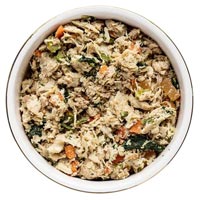 Read Reviews |
Varies |
 |
 |
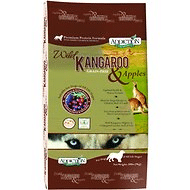 Read Reviews |
$4.32/lb |
 |
 |
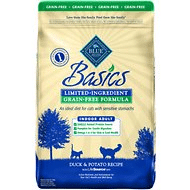 Read Reviews |
$3.09/lb |
 |
 |
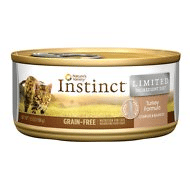 Read Reviews |
$2.01/5.5 oz Can |
 |
 |
 Read Reviews |
$1.99/oz |
 |
 |
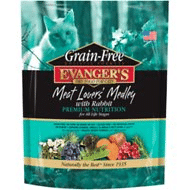 Read Reviews |
$2.85/lb |
 |
 |
Smalls for Smalls Fresh Chicken Pate
Smalls for Smalls is a human-grade cat food delivery service that strives to help cats “get back to nature” by providing nutritious meals with whole foods and no fillers or preservatives. Cats get most of their nutrition from meat, and Smalls by Smalls makes that easy with their high-protein recipes. Also important, cats get most of their hydration from their food, so with the high water content in the Smalls by Smalls recipes, you will never have to worry about keeping your cat hydrated. When you sign up for Smalls by Smalls, you will fill out a profile about your cat so that the food you get is exactly what your cat needs.
NomNomNow

NomNomNow cat food is a human-grade cat food, making it one of the best choices for your Birman. When you sign up for the service, you complete a profile all about your cat, and NomNomNow will create a specially designed recipe just for your pet, as well as a customizable delivery schedule. NomNomNow foods are high in protein and high in moisture, something that is beneficial for cats as they usually need high protein diets, and they get a lot of their water intake through their food. The chefs who customize your cat’s recipe will take into consideration their lifestyle, so you know that your cat will be getting enough calories to stay healthy and strong, but not so many that they are gaining weight or becoming unhealthy.
Addiction Holistic Dry

The Addiction pet food company was only founded in 2002 so it is still a fairly young company. Though this company hasn’t been around as long as some others, they have certainly made a name for themselves within the premium pet food industry. Addiction pet foods are formulated by clinical nutritionists and holistic veterinary surgeons to ensure that they provide the optimal degree of nutrition using the freshest ingredients available in recipes that are complete and balanced for cats in all life stages. All of Addiction’s pet food products are designed using high-quality wild game meats that are not only richer in nutrients than traditional pet food proteins but they are also hypoallergenic for cats and easier to digest – all of these things make Addiction pet foods great options for sensitive digestion cat food products.
Though Addiction pet foods are rapidly gaining in popularity, the company still offers a fairly limited selection of products. The products they do offer, however, are of the highest quality and guaranteed to provide your cat with the optimal degree of balanced nutrition. Addiction’s two dry food options are perfect for cats with sensitive stomachs because they are made with novel proteins like salmon and venison. The two recipes available are Salmon Bleu and Viva La Venison. The Salmon Bleu recipe features Pacific salmon which is not only rich in protein, but a great source of essential fatty acids and omega fatty acids. The Viva La Venison recipe is made with free-range New Zealand venison, balanced with fresh fruits and vegetables for added nutrition. Both recipes are completely grain-free and gluten-free, made without artificial ingredients or low-quality fillers.
Blue Buffalo Basics Limited Ingredient Diets

When it comes to quality pet foods, Blue Buffalo is one of the most recognizable brands on the market. The company was founded by two dedicated dog owners who wanted to create a high-quality, nutritious diet for their dog. Since then, the brand has exploded and it now offers a huge selection of pet food products for dogs and cats. There are four main product lines as well as a line of natural veterinary diets. The BLUE line of products is all-natural and the Freedom line includes an assortment of grain-free dry foods and canned foods. The Wilderness line is protein-rich, inspired by the diet of wild cats and dogs while the Basics line includes a variety of limited ingredient diets. If you are looking for a quality sensitive digestion cat food, you will find one within the Blue Buffalo Basics line of products.
The Blue Buffalo Basics line of products includes three dry food and three wet food options for cats. The three dry food recipes are Duck and Potato, Fish and Potato, and Turkey and Potato. These same flavor combinations are also available in wet food form. Each of Blue Buffalo’s LID dry foods are made with a single source of quality animal protein, supplemented with easily digestible carbohydrates like potatoes and peas. They contain no corn, wheat, or soy ingredients and they are balanced with omega-3 and omega-6 fatty acids for healthy skin and coat. In addition to an assortment of quality ingredients, each of these recipes also includes Blue Buffalo’s LifeSource bits which contain a proprietary blend of antioxidants, vitamins, and minerals to help ensure that your cat receives complete and balanced nutrition. These dry foods also contain chelated minerals for maximum nutrient absorption and dried fermentation products to help improve and regulate your cat’s digestion. Overall, any of Blue Buffalo’s limited ingredient diets would be a great choice for your cat.
Nature’s Variety Instinct Limited Ingredient Diets

The Nature’s Variety pet food company has become one of the biggest names in the premium pet food industry. Not only does this company use high-quality ingredients in their formulas, but they offer a large variety of products including dry foods, canned foods, fresh foods, and frozen foods. According to their website, the Nature’s Variety brand seeks to transform the lives of pets with healthy nutrition – they say Yes to raw and No to processed ingredients. A quick review of some of their most popular products reveals that they do indeed use quality meats and digestible carbohydrates, excluding corn, wheat, and soy ingredients as well as others fillers. Among their wide variety of products, Nature’s Variety offers a selection of Limited Ingredient Diets which are perfect for cats with sensitive stomachs or food allergies.
Within the Nature’s Variety Limited Ingredient Diet line of sensitive digestion cat foods that are both dry and wet food options. Each of these recipes is made with a single source of animal protein as well as other quality ingredients – there is no grain, gluten, dairy, eggs, potato, chicken, beef, or fish so you can rest easy that these products will not trigger your cat’s allergies. For dry food products there are two options – Rabbit Meal Formula and Turkey Meal Formula. Both of these recipes are made with meat meals that have already been cooked down to a low moisture level which means that the volume of protein included in the product is very high. For carbohydrate, these recipes utilize green peas and tapioca. The four wet food options feature premium proteins like duck, lamb, rabbit and turkey. They are all grain-free and loaded with easily digestible ingredients.
Stella and Chewy’s Freeze-Dried and Frozen Meals

While Stella and Chewy’s may not offer any sensitive digestion cat foods that are marketed as such, their freeze-dried and frozen cat food recipes are made with high-quality ingredients in nutritious formulas that offer premium nutrition for cats with sensitive stomachs. Stella & Chewy’s believes that pets thrive on the kind of diet they would have eaten in the wild which is why they use premium raw ingredients like wild-caught fish, cage-free poultry, and grass-fed meats in all of their recipes. They also add organic fruits and vegetables to help ensure balanced nutrition. All of their cat food recipes consist of 98% meat, organs, and bone with no grains, glutens, fillers, or artificial additives. Basically, there is nothing in Stella & Chewy’s food that would bother your cat’s sensitive stomach.
According to the brand website, Stella & Chewy’s raw diets not only help to improve digestion and relieve allergies, but they also support your cat’s healthy skin and coat as well as healthy teeth and gums. When it comes to freeze-dried food, there are five recipes featuring quality proteins like chicken, duck, salmon, turkey, and cod. Not only are these recipes made with premium ingredients but they are freeze-dried which means that they can be stored and fed like traditional dry cat food. For frozen raw foods, Stella & Chewy’s offers three recipes: Chick, Chicken, Chicken; Duck Duck Goose; and Absolutely Rabbit. In addition to being made with premium proteins, Stella & Chewy’s cat food includes chelated minerals for maximum nutrient absorption and dried fermentation products to help improve and regulate your cat’s digestion. All of their recipes are complete and balanced for cats in all life stages.
Evanger’s Dry Products

The Evanger’s pet food company was founded in 1935 by Fred Evanger who set out to create his own recipe for pure meat canned foods to use in his kennels. In the years that followed, the brand grew exponentially and in 2002 released a line of hand-packed pet food. All of Evanger’s products are made with high-quality ingredients in nutritious formulas to help provide pets with premium nutrition. For cats, Evangers offers a wide variety of options including dry food, grain-free game meats, organic food, dried organ meats, classic dinners, and more. Because all of their products are made with fresh, natural ingredients they are very good for cats with sensitive stomachs. Among some of their top products are the two dry food options.
When it comes to sensitive digestion cat food from Evanger’s, there are two dry food recipes to choose from: Pheasant and Whitefish and Grain-Free Meat Lovers Medley with Rabbit. The Pheasant and Whitefish dry food recipe features two novel protein sources, pheasant and whitefish, as the primary ingredients but other proteins like duck appear further down the list. This recipe is made with gluten-free and grain-free carbohydrates like oatmeal and millet, plus fresh fruits and vegetables to help ensure complete and balanced nutrition. The Grain-Free Meat Lovers Medley with Rabbit recipe features three unique proteins – beef, rabbit, and pork – as well as digestive carbohydrates like sweet potato and peas. Both of these recipes are high in protein and healthy animal fats, plus they are supplemented with probiotics to help ensure healthy digestion.
Conclusion
Many cat owners find that their cats are incredibly picky when it comes to their food. But if your cat refuses to eat very much, it could be an indication of a bigger problem, not just a picky nature. If you suspect that your cat is suffering from digestive issues you should consult your veterinarian as soon as possible and switch your cat over to a sensitive digestion cat food.












